In an era that’s marked by quickfire innovations in technology, the fast-paced digital landscape is still evolving at an unprecedented pace. Artificial Intelligence (AI) is becoming more and more prevalent for businesses to leverage as they strive to stay ahead of their competitors. Having AI that is accessible to marketers has been game-changing. It’s enabled optimised strategies, personalised experiences, and almost unbelievable growth.
A glance at Google Trends reveals just how remarkable the upswing that AI has experienced over the last few years is. UK search volume for topics like “AI marketing” has risen by 357%, and interest in “chatbots” has skyrocketed by 485%. Likewise, “AI in digital marketing” has gone from a topic that just wasn’t being considered to a heavily searched-for subject. As you’d expect, the global AI market is therefore projected to grow substantially, and its value is predicted to exceed $190 billion by 2025!
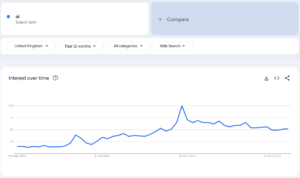
There’s no shortage of content discussing AI and its capabilities in digital marketing. But beyond the generalities, the real value comes from understanding the tangible benefits unlocked in specific service areas when AI is thoughtfully implemented. Its capabilities go far beyond the automation of repetitive tasks, and the applications of AI are expanding even as you read these words.
However, harnessing its full potential requires a nuanced view into how these technologies can enhance strategy and execution in disciplines such as Paid Media, SEO, PR, Content Production, Web Design, and Web Development.
That’s why in this article, we cut through the AI buzz and directly explore the tested ways leading agencies (like ourselves!) are weaving AI into the fabric of modern marketing.
AI in Paid Media
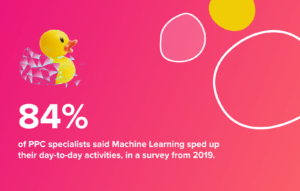
Back in 2019, 84% of PPC specialists said that machine learning (a form of AI) sped up their day-to-day work… and machine learning has improved a lot in the years since then! AI offers advanced tools and techniques that optimise campaigns, improve targeting, and enhance overall performance. Here are the top ways AI is being utilised in Paid Media:
- Adjusting bids in real-time based on factors like competition, historical data, and conversion rates, maximising the value of ads.
- Analysing user data and behaviour to identify high-converting audience segments, enabling the creation of precise targeting strategies.
- Automatically customising ad content based on user characteristics like location, browsing history, and preferences, thereby increasing relevancy.
- Identifying irrelevant or low-performing keywords that might be draining ad budgets.
- Detecting suspicious activity and fraudulent clicks, helping advertisers to minimise wastage of ad spend as a consequence of invalid interactions.
Initially, AI and machine learning was viewed with suspicion by many PPC specialists, but paid media is probably now one of the niches within marketing that has most rapidly integrated and implemented AI tools.
However, there are still pitfalls to avoid, and the biggest one relates to the temptation to let the inclusion of AI excuse you from doing proper groundwork. AI algorithms are fantastic for data analysis, but it’s still advisable to have a human critically analyse a data set too.
AI can be a wonderful tool for automating repetitive PPC tasks, but adding a dash of human creativity ultimately leads to more inspiring content. Just because an AI-rule will keep a campaign running automatically, doesn’t mean that PPC specialists should just leave it to do so. And, of course, the insights that are provided by many ad platforms are intended for human eyes and require manual implementation. Viewing AI as the starting point for a successful paid media campaign, not as the endpoint, is therefore the way to make the best use of it.
At Soap Media, we’ve witnessed AI demonstrably enhance outcomes for paid media marketing across numerous client accounts. Its analytical capabilities have helped us rapidly uncover and respond to patterns in data that would otherwise take hours of research. Instead of fully handing the reins to AI, we leverage its potential to amplify our own insights. Our PPC specialists have seen a significant uplift in ROI and campaign scalability compared to pure manual work alone.
FURTHER READING: Considering using AI even more in paid media and reducing the human touch? Explore the refined role of AI in ad auctions, ad copy, and data analytics. Discover the good, the bad, and everything in-between in our Soapbox piece From Algorithms to Engagement: Unleashing the Power of AI in Paid Media
AI in SEO
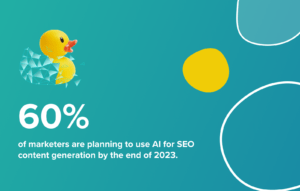
Only 10% of marketers were using AI for SEO content generation earlier this year, but almost 60% expressed intent to do so by the end of 2023, and it’s easy to see why. AI enables more precisely-optimised content and strategies within SEO. Here are the top ways AI is being utilised in SEO:
- Analysing vast amounts of data to identify relevant keywords with high search volume and low competition, and also search trends.
- Conducting competitor analysis, tracking rivals’ rankings and strategies to uncover new insights.
- Analysing search queries and patterns to understand user intent behind specific keywords, allowing content to be tailored to user expectations.
- Helping businesses to optimise their local search campaigns by analysing location-based data and providing recommendations for improving local SEO.
- Analysing historical search algorithm changes and patterns to predict potential future updates.
Of course, SEO optimisation via AI can go a long way towards speeding up the day-to-day business of an SEO professional, but – once again – we highly recommend that you should maintain a humanly-audited step in your processes.
In a recent survey of digital marketers in the US, the single biggest concern relating to AI in marketing was that it may not produce properly optimised content. For example, many AI tools are working with data sets that are at least a year or two old; they simply aren’t able to consistently access the current, finger-to-the-pulse data that a human can when they are observing data in real-time. As a result, the keywords that an AI tool has suggested really need checking against the current landscape.
Remember those Google Trends statistics at the beginning of this article? We didn’t get those with the help of AI! AI is a starting point in the optimisation process, but not the end.
To highlight another reason for caution, we also wouldn’t advocate disavowing links to your website purely because an AI tool has suggested that you do so. Google already ignores many links to your site that it deems irrelevant. We’ve been asked to handle too many instances of freefalling keyword rankings as a result of over-enthusiastic disavows to not want to manually audit a backlink dataset.
As a leading digital marketing agency, we have experienced firsthand the advantages AI can offer SEO when applied strategically. When used to complement human ingenuity rather than fully replace it, AI strengthens our SEO capabilities and our clients have seen AI elevate their SEO success when implemented by specialists who understand its realistic applications.
FURTHER READING: AI’s growing role in SEO presents both opportunities and challenges. While it offers efficiency, relying solely on AI for content creation risks diluting brand authenticity. A balanced approach is crucial. Explore further insights in our Soapbox piece AI and SEO: The Productive Partners
AI in Digital PR
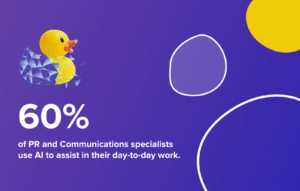
Over 60% of professionals who work in PR and communications are already using AI to complement their daily working practices. When it’s integrated into digital PR, AI can enhance efficiency, effectiveness, and strategic decision-making. Here are the top ways AI is being used in Digital PR:
- Helping humans with sentiment analysis to determine whether mentions and conversations related to a brand are positive, neutral, or negative.
- Automating the process of generating reports and analytics, enabling marketers to provide timely updates to stakeholders.
- Analysing historical data to predict future trends and potential PR crises, helping PR teams to prepare for challenges and seize opportunities.
- Identifying relevant influencers and thought leaders based on specific criteria, assisting targeted outreach campaigns to reach the correct audience.
- Analysing journalists’ past articles and preferences to suggest personalised pitch angles, improving the chances of successful media coverage!
However, although AI is quickly becoming the PR professionals’ best friend, we shouldn’t lose sight of what PR is: public relations… between real people!
The vast majority of consumers greatly appreciate the speedy response that chatbots provide. However, the lack of empathy and inability to divert from limited responses can also lead customers to feel that their concerns aren’t being dealt with seriously or with genuine care. That’s a PR disaster waiting to happen, and Hubspot reports that a single bad experience with a company can lead ½ consumers to cut all ties with a brand.
To incorporate AI with our Digital PR activities in a more balanced way, we discovered that the best way to use it is to learn from it. AI researches, and we take action. For example, AI-driven sentiment analysis allows us to gauge public sentiment accurately, enabling us to adjust our PR strategies in real time.
AI in Content Writing
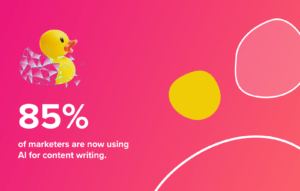
85% of marketers in 2023 are now using AI for content writing, up from around 20-30% in 2022. It’s transformed the process of content creation – especially the research hours. AI aids content writing in the following ways:
- Quickly gathers relevant information and sources from the web. This is perhaps the most immediately noticeable benefit, saving writers a lot of time.
- Efficiently and accurately translates content into various languages, expanding its reach to global audiences.
- Generates concise and coherent summaries of longer texts, making it easier to distil complex information into digestible formats.
- Creates social media posts and captions that are optimised for engagement and tailored to specific platforms.
- Composes personalised email subject lines and content, increasing the effectiveness of email marketing campaigns.
AI certainly helps with content generation, but that’s not to say that you should down tools and sit back while our new AI overlords write all your blogs! AI writing tends to follow patterns that can be quite easy to spot, and this means that the creativity of a human writer can be lacking.
There’s also the elephant in the room: will search engines penalise AI-created content? At the moment, Google seems to be signalling that, as long as content provides value to a reader, it won’t be demoting or penalising AI content. However, pure AI-generated content is prone to the inclusion of factual inaccuracies that a human writer simply wouldn’t be guilty of. As a result, its value is limited. Even CNET has been embarrassed by this. After leveraging AI to create a vast number of articles that were designed to top the search engines, the tech news giant was outed and forced to issue corrections to over half of their content output. The tool that they used was also guilty of plagiarising the content of competitors. Not a great look!
At Soap, we’ve learned how to effectively incorporate AI tools into our content writing and production model. While we still rely on our talented content writers for high-level strategy and bringing their unique perspectives, using AI tools means we can expand our output significantly. The raw material supplied by AI is moulded by our writers’ creativity rather than replaced. This hybrid approach allows us to develop 10X more content than otherwise possible, freeing our writers to focus their talents on priority projects and in-depth pieces.
AI in Design
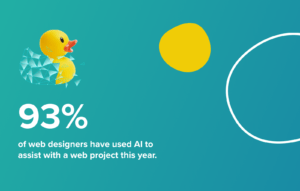
Over 93% of web designers have used AI to assist with a web design project in 2023. AI plays a significant role in streamlining the design process, enhancing user experience, and enabling the creation of better websites. It can be used in web design in the following ways:
- Analysing content and generating layout options, that are based on design principles and user preferences, to create visually-appealing and balanced layouts.
- Analysing user behaviour and preferences to customise website content and layout for individual visitors.
- Suggesting colour palettes and typography choices that are based on a website’s purpose, target audience, and industry trends.
- Analysing A/B testing results to determine which design variations perform better in terms of user engagement, conversions, and other key metrics.
- Ensuring that websites are accessible to users with disabilities by recommending optimal colour contrast, alt text for images, and keyboard navigation.
We love creating websites that are driven by data, and adding a touch of AI to the mix can really help us to do this. Of course, you have to be aware that AI analyses are not infallible, but the benefits of being able to draw together many strands of data at speed are clear.
However, we also love creating websites because there’s nothing like the thrill of coming up with a genuinely creative design! Be honest, do you think an AI-designed digital marketing website would have featured our very own loveable rubber duck mascot, complete with gently-rolling waves? We don’t think so!
FURTHER READING: Been inspired to incorporate new ways of using AI within your design practices? Before you do, we recommend taking a deep dive into the legal considerations surrounding AI-generated imagery with our guide on How to Use AI-Generated Imagery and Not Get Sued.
AI in Development
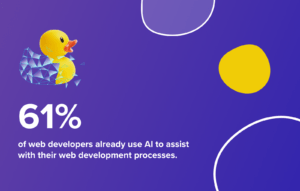
According to a Forbes Insights report, 61% of participants are already using AI in their web development processes. AI provides tools, frameworks, and solutions that streamline various aspects of the development process, enhancing code quality, and enabling developers to create more efficient and innovative applications without tedious repetition. Here are the top ways AI is being utilised in web development:
- Analysing code to identify bugs, errors, outdated frameworks, and potential security vulnerabilities, ultimately reducing debugging time.
- Automating the testing process by generating test cases, executing tests, and identifying areas of code that require additional testing coverage.
- Providing real-time code completion suggestions, reducing typing effort and helping developers adhere to best practices.
- Analysing logs, user feedback, and historical data to predict maintenance needs and prioritise tasks for software updates and improvements.
- Analysing application performance data to identify optimisation opportunities, enabling developers to fine-tune code for better responsiveness and efficiency.
Of course, responsible and ethical implementation of AI within web development is still going to need some human input, and not just for the sake of creativity. For example, AI tends to learn from existing data, but relying on it to make decisions about something like user experience could lead to outcomes that might be discriminatory or unfair. AI also has decision-making capabilities that are limited to the data array that’s been used to train it.
Sometimes, it can be tempting for web developers to view AI as an unwelcome arrival that might rob them of their careers, but we actually don’t think that’s the case. We think that harnessing the power of AI will empower many developers to work faster, smarter, and more cost-effectively than ever before… but they will still need to work themselves! AI allows developers to dedicate their time to the areas that really need their particular expertise; it shouldn’t replace it.
At our agency, we’ve managed to successfully integrate AI tools into our web development workflows. For starters, it saves us vast amounts of repetitive coding work when it comes to generating semantic website frameworks. We then have our expert developers refine and customise the framework for each project’s specific needs. Ultimately AI enables our web developers to focus their talents on strategic coding, complex functionality, creative solutions, and top-notch UX!
FURTHER READING:
Find out how advancements in machine learning is shaping the web development industry for the better. Explore how developer tools that use AI and machine learning in platforms like Github and BitBucket can assist with code reviews, error monitoring and more in our Soapbox piece Cutting Costs, Elevating Quality: AI’s Transformative Influence in Web Development.
Learn about the evolving threat of AI-driven spambots and the challenges they pose to online security measures like CAPTCHA. Discover proactive strategies and advanced solutions to combat these threats effectively in our Soapbox piece Navigating the Minefield: Is reCAPTCHA Still Effective in the Age of AI Spambots?
AI and Soap Media
Throughout this blog, you’ll have noticed a couple of common themes:
- We’re fans of AI.
- We’re also pretty big fans of good old-fashioned human beings!
Together, AI and human input can achieve great things, getting through more work and allowing more data-driven insights than ever before. However, AI is not the one-size-fits-all solution to your digital marketing problems.
If you make use of it to complement your human efforts, you’ll almost certainly reap the rewards, but if you depend on it exclusively then you’re not doing yourself any favours.
Nonetheless, if you’re one of the many people who has already embraced AI in marketing, or are someone who’s looking on with interest and is itching to get started, then our experts are only a call away. We can show you how to get the most out of using AI in your digital marketing, and may even be able to give you some pointers if you’re already an AI enthusiast! You may even find that some of our bespoke digital marketing solutions would provide exactly what you need to ensure that your business is well-placed to take advantage of the possibilities for growth in the new era of AI.
Further Reading
- Preparing for a Cookieless Future
- What is Machine Learning?
- How to Use AI-Generated Imagery and Not Get Sued
- From Algorithms to Engagement: Unleashing the Power of AI in Paid Media
- Cutting Costs, Elevating Quality: AI’s Transformative Influence in Web Development
- Navigating the Minefield: Is reCAPTCHA Still Effective in the Age of AI Spambots?
- AI and SEO: The Productive Partners
